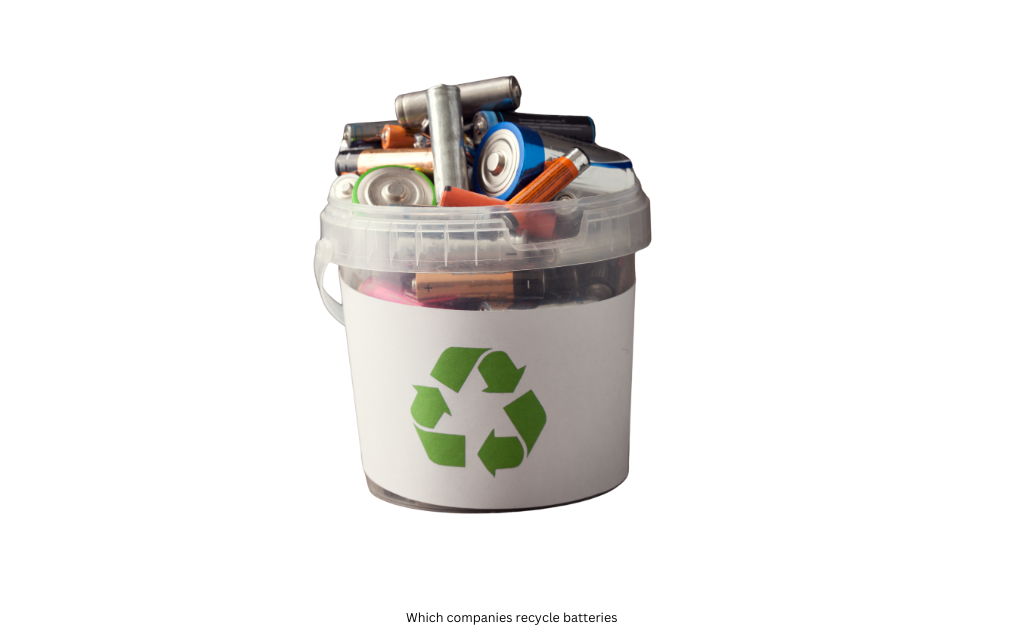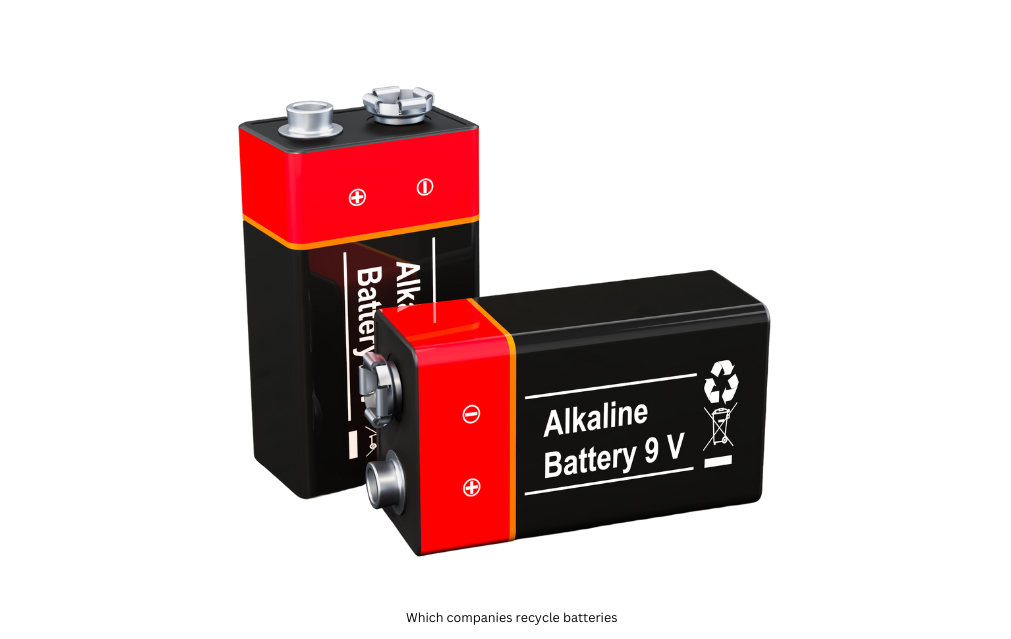Did you know that billions of batteries are thrown away every year, and many end up in landfills? These batteries contain harmful chemicals that can pollute soil and water. Yet, most people don’t know where to recycle them or which companies handle battery recycling.
Battery waste is a growing problem. With the rise of rechargeable lithium-ion batteries in phones, laptops, and electric vehicles, proper disposal has never been more important. But finding reliable recycling companies can be confusing. Which ones accept lithium batteries? Are all batteries recyclable? Many people struggle with these questions.
This guide will help you understand which companies recycle batteries and how they process them. You’ll learn about top recyclers, their methods, and how you can safely dispose of used batteries.
Let’s explore the best companies leading the way in battery recycling and how their efforts are shaping a cleaner future.

How Battery Recycling Works: What You Need to Know
Batteries power almost everything—phones, laptops, cars, and even homes. But what happens when they stop working? Throwing them away isn’t safe. Many contain toxic materials that can leak into the environment. Recycling is the best way to handle old batteries, but not all types are processed the same way.
Can Rechargeable Batteries Be Recycled?
Yes, but it depends on the type. Rechargeable batteries, like lithium-ion and nickel-cadmium, contain metals that can be recovered and reused. The process involves breaking them down, extracting valuable elements like lithium and cobalt, and repurposing them for new batteries. Scientists say recycling these metals reduces the need for new mining, which helps the planet. However, recycling facilities for lithium-ion batteries are still limited, making the process less efficient than it should be.
Which Batteries Can Be Recycled?
Some batteries are easier to recycle than others. Here’s a look at the most common types:
- Alkaline Batteries – Used in remote controls, toys, and flashlights. Some facilities recycle them, but many still end up in landfills.
- Lithium-Ion Batteries – Found in phones, laptops, and electric vehicles. These are highly recyclable but require special handling due to fire risks.
- Lead-Acid Batteries – Used in cars and industrial machines. These are among the most recycled batteries, with over 95% of lead recovered.
- Nickel-Cadmium Batteries – Common in power tools and medical equipment. They contain toxic cadmium, so proper recycling is crucial.
Are We Recycling Batteries the Right Way?
Not as much as we should. Studies show that less than 10% of lithium-ion batteries are recycled worldwide. Lead-acid batteries have a much better rate, but other types still lag behind. The main challenges include:
- Lack of awareness – Many people don’t know where to recycle batteries.
- Limited recycling centers – Many areas don’t have proper facilities.
- Costly processes – Extracting valuable materials from batteries is expensive.
The good news? More companies are working on better recycling methods. As technology improves, recycling batteries will become easier, safer, and more efficient.
Companies That Recycle Batteries: Who’s Leading the Way?
Battery waste is growing fast. Some companies are working hard to recycle them, recover valuable materials, and reduce pollution. Different batteries need different recycling methods. Some companies focus on lithium-ion batteries, while others recycle car batteries or general household batteries.
Recycling Lithium-Ion Batteries: Leaders in Innovation
Call2Recycle
- What they recycle: Lithium-ion, nickel-cadmium, and small rechargeable batteries.
- How they recycle: Batteries are collected, sorted, and sent to specialized facilities. Metals like lithium and cobalt are extracted and reused.
- Where they operate: Mostly in North America.
Redwood Materials
- What they recycle: Lithium-ion batteries from electric vehicles, phones, and laptops.
- How they recycle: Uses high-tech processes to extract lithium, nickel, and cobalt. Their system reuses nearly all materials.
- Where they operate: Based in the U.S., expanding globally.
Li-Cycle
- What they recycle: Lithium-ion batteries from electronics, power tools, and EVs.
- How they recycle: Uses a two-step process—shredding and chemical recovery—to extract valuable metals.
- Where they operate: North America and Europe.
General Battery Recycling: Handling All Types
Retriev Technologies
- What they recycle: Alkaline, lithium-ion, and lead-acid batteries.
- How they recycle: Uses mechanical and chemical processes to recover metals. They handle industrial and consumer batteries.
- Where they operate: U.S. and Canada.
G & P Batteries
- What they recycle: Household, industrial, and commercial batteries.
- How they recycle: Focuses on safe disposal and metal recovery. Also provides battery collection services.
- Where they operate: Primarily in the UK.
Car Battery Recycling: Keeping Heavy Metals Out of Landfills
Exide
- What they recycle: Lead-acid car batteries and industrial batteries.
- How they recycle: Separates lead, plastic, and acid. Lead is melted and reused in new batteries.
- Where they operate: Worldwide, with major facilities in the U.S. and Europe.
Battery Solutions
- What they recycle: Car, industrial, and consumer batteries.
- How they recycle: Collects and sorts batteries, then sends them to the right facilities for material recovery.
- Where they operate: North America.
Umicore
- What they recycle: EV batteries, lead-acid, and lithium-ion batteries.
- How they recycle: Uses a high-temperature process to recover cobalt, nickel, and lithium.
- Where they operate: Europe and Asia, with growing global reach.
Why These Companies Matter
Each of these companies is helping reduce battery waste. Some focus on electric vehicle batteries, while others recycle everyday batteries. As battery use increases, their role will become even more important.
How Battery Recycling Works: Step by Step
Recycling batteries isn’t simple. It takes several steps to recover valuable materials and make new batteries. Companies use different methods, but most follow a similar process.
Step 1: Collecting and Sorting Used Batteries
The first step is gathering old batteries. Collection points are set up in stores, recycling centers, and factories. Some companies, like Call2Recycle and Battery Solutions, offer mail-in programs. Once collected, batteries are sorted by type. Lithium-ion, lead-acid, and alkaline batteries need different recycling processes. Sorting prevents dangerous chemical reactions and makes recycling more efficient.
Step 2: Extracting Valuable Materials
Once sorted, the batteries go through a breakdown process:
- Shredding – Machines crush batteries into small pieces. This makes it easier to separate materials.
- Heat Treatment – Some companies, like Umicore, use high temperatures to melt metals like cobalt, lithium, and nickel.
- Chemical Processing – Facilities like Li-Cycle use liquid solutions to extract valuable elements without high heat.
Lead-acid batteries are easier to recycle. The lead is melted and purified, while the acid is neutralized or turned into new products.
Step 3: Reusing Materials in New Batteries
Recycled materials don’t go to waste. Lithium, cobalt, and nickel are used to make new battery cells. Lead from car batteries is remade into fresh battery plates. Even plastic casings are melted down and reshaped. Companies like Redwood Materials focus on sending recovered materials straight back to battery makers, reducing the need for new mining.
Why This Process Matters
Battery recycling keeps harmful chemicals out of the environment. It also reduces the demand for new raw materials. The more we recycle, the less we need to mine for lithium, nickel, and lead. As technology improves, recycling will become even more efficient.

Challenges & Future of Battery Recycling
Recycling batteries is important, but it’s not easy. Companies face many challenges, but new technologies are bringing hope for the future.
Current Challenges in Battery Recycling
- High Costs – Recycling batteries is expensive. The process needs special machines, trained workers, and strict safety measures. This makes recycling less profitable than mining new materials.
- Lack of Awareness – Many people don’t know how or where to recycle batteries. Some throw them in the trash, which harms the environment. Without better education, many batteries will continue to end up in landfills.
- Complex Recycling Process – Batteries contain different metals, chemicals, and materials. Separating them is difficult. Some batteries, like lithium-ion, can catch fire if handled incorrectly. This makes recycling dangerous and slow.
Innovations Shaping the Future
- AI-Based Sorting – New machines use artificial intelligence to quickly identify and separate battery types. This speeds up recycling and reduces errors.
- Advanced Material Recovery – Scientists are developing better ways to extract lithium, cobalt, and nickel. Some companies use eco-friendly chemicals instead of high heat to recover materials safely.
- New Recycling Startups – Many startups are focusing on battery recycling. Companies like Redwood Materials and Li-Cycle are creating cleaner, faster, and more efficient recycling methods.
The Road Ahead
As battery use grows, recycling must improve. Governments, companies, and people need to work together to make battery recycling easier and more common. With better technology and awareness, the future of battery recycling looks bright.
How to Recycle Batteries? (User Guide)
Recycling batteries is easy when you know where to take them and how to handle them safely. Proper disposal helps protect the environment and conserves valuable materials. Follow these steps to recycle batteries responsibly.
Where Can You Drop Off Batteries?
- Retail Stores – Many electronics and hardware stores, such as Best Buy, Home Depot, and Staples, have battery recycling bins. You can drop off small rechargeable and single-use batteries there.
- Recycling Centers – Local waste management facilities accept different types of batteries. Check with your city’s recycling program for details on accepted battery types.
- Manufacturer Take-Back Programs – Some companies, like Call2Recycle and Tesla, offer mail-in or drop-off programs for used batteries. These programs ensure batteries are disposed of safely.
- Hazardous Waste Collection Events – Many communities host special collection events for hazardous waste, including old batteries. These events provide a safe way to dispose of batteries that may contain harmful chemicals.
Tips for Safe Battery Disposal
- Tape the Terminals – Cover battery terminals with tape to prevent short circuits. This is especially important for lithium-ion batteries.
- Keep Batteries Dry – Store used batteries in a cool, dry place before recycling. Avoid mixing damaged batteries with regular ones.
- Never Toss Batteries in the Trash – Batteries contain toxic materials that can leak into the environment. Disposing of them improperly can cause pollution or even start fires.
- Recycle in Small Batches – If you have a large number of batteries, take them to a recycling center in smaller batches to minimize safety risks.
Recycling batteries correctly ensures they don’t end up in landfills, where they can harm the environment. With a little effort, you can make a big difference in keeping our planet clean.
Conclusion
Batteries power our daily lives, but they also create waste that harms the environment. Recycling them properly helps conserve resources and reduces pollution. Many companies, such as Call2Recycle, Redwood Materials, and Exide, are working to make battery recycling easier and more effective.
Different types of batteries, including lithium-ion, lead-acid, and nickel-cadmium, can be recycled. However, the process faces challenges like high costs and limited awareness. New technologies, such as AI-based sorting and advanced material recovery, are improving recycling efficiency.
You can do your part by dropping off used batteries at retail stores, recycling centers, or manufacturer take-back programs. Always handle old batteries safely by taping terminals, keeping them dry, and never throwing them in the trash.
Every recycled battery helps protect our planet. Take action today and make battery recycling a habit!
